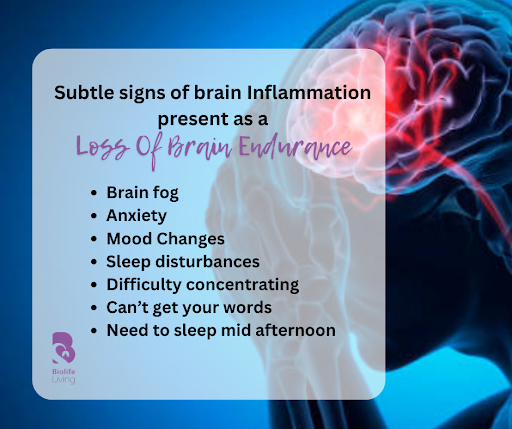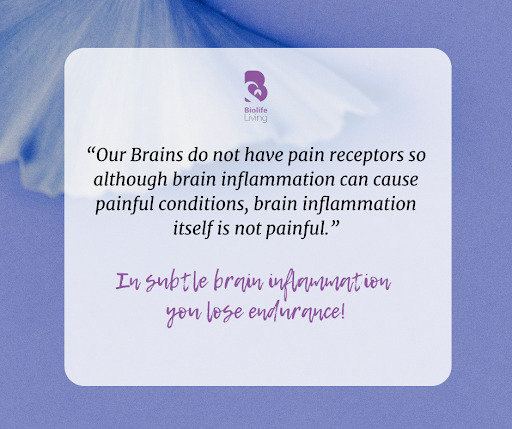
I feel terrible, my brain fog is worsening but I’m told there is nothing wrong with me and it’s just part of aging… but I’m only 45.
The glymphatic system
Your brain is an incredibly powerful organ that plays a vital role in all aspects of your daily life, including cognition, memory, motor control, hearing, sight, emotions, attention, concentration, and sleep regulation.
Brain inflammation, also known as neuroinflammation, is a complex condition influenced by various factors. It can significantly impact or contribute to numerous health issues, such as Chronic Depression, Anxiety, Traumatic Stress, Alzheimer’s, Parkinson’s, Concussion.
Does brain inflammation play a role across general health conditions like thyroid function, metabolic conditions like insulin resistance and obesity through to hormonal imbalances?
Given the brain’s critical role in daily functioning, when do you consider brain inflammation as a potential factor in various health conditions and when do you start to look after the health of your brain?
When was the last time you considered the health of your brain?
What does brain inflammation look like?
Many of us tend to overlook our brain health when dealing with various health conditions. Often, our brains give us subtle signs that they need support, but we dismiss these signs as just “aging” or “that’s just me.”
Our brains can become inflamed in response to injury, infection, toxins, or autoimmune conditions. Unlike inflammation in other parts of the body, brain inflammation is often subtle and does not typically present as ‘painful’ conditions, this is because we do not have pain receptors in our brains like we do in other parts of our body. When our brains become inflamed it can exacerbate other conditions that cause pain.
Brain inflammation can present as a loss of brain endurance with symptoms like:
- Brain Fog
- Anxiety
- Forgetfulness – can’t remember where you put things
- Mood changes – it may be that you are quick to get angry
- Sleep disturbances
- Difficulty concentrating
- Difficulty getting words out
- Overwhelmed by too much stimulation
- Maybe you used to be able to drive for 3 hours, but now you can no longer drive longer than an hour.
Recognizing these signs and then supporting the health of your brain can help you with long term brain health and overall well-being.
How often are you ignoring subtle signs of brain inflammation?

How Is Brain Inflammation Involved with Diseases
When many of us think of brain inflammation we think of progressed diseases and conditions like:
- Cognitive and mental functioning
- Alzheimer’s Disease: Chronic inflammation in the brain is believed to contribute to the development and progression of Alzheimer’s disease by accelerating neuronal damage and the accumulation of amyloid plaques.
- Parkinson’s Disease: Inflammatory processes are implicated in the death of dopaminergic neurons in Parkinson’s disease.
- Multiple Sclerosis (MS): MS is characterized by an autoimmune response leading to inflammation and damage to the myelin sheath, the protective covering of nerve fibers.
- Depression and Anxiety: There is growing evidence suggesting that inflammation within the brain may contribute to the pathophysiology of mood disorders, influencing neurotransmitter function and brain structure.
- Traumatic Brain Injury (TBI): Inflammation following a TBI can lead to secondary injury and long-term cognitive deficits.
But remember these are diagnosed conditions.
In Chronic Brain inflammation leading to degenerative diseases, you don’t suddenly wake up one morning with the disease. Subtle brain inflammation is where nerve conduction decreases, often referred to as brain fog. This can result in taking longer to think or find the right words. You might also notice that you used to be able to drive for two hours, but now after an hour it’s too much; this is a sign of reduced ATP (energy), a result of brain inflammation.

How does your brain become inflamed?
Our brains can become inflamed from a number of pathways including:
- Infections,
- Systemic inflammation in lung or bladder infections, (15, 16)
- Liver and gut inflammation have direct pathways to the brain via the vagus nerve so when these organs are inflamed, inflammatory cytokines can travel directly to the brain via the vagus nerve causing inflammation in the brain. (17)
- General inflammation within the body can cause inflammatory cytokines in other parts of the body to turn on brain inflammation. (15,16,17)
- Reduced antioxidant reserves within the body can increase BBB permeability and lead to brain inflammation, increasing oxidative stress and brain Inflammation. (18)
- High blood sugar Levels lead to inflammation which can damage brain cells. Did you know that Alzheimer’s Disease is now being classed as Type 3 Diabetes (14).
If this is, you and you’re concerned about Brain Fog why not start today? Why wait?
Enjoy FREE Shipping when you order a minimum of two items. Use BrainHealth20 at checkout for 20% off your order when ordering two items.
References.
- Dr Jockers. (2024). Brain Autophagy: Healing the Toxic Brain. https://drjockers.com/brain-autophagy/
- Schmoe, J. Dr. (2024). Do you have Brain Inflammation? How to know and what to do. https://thefnc.com/research/do-you-have-brain-inflammation/
- Schmidt, C. (2021). Inflammation and brain health. https://magazine.hms.harvard.edu/articles/inflammation-and-brain-health
- Kiecolt-Glaser, J.K., Derry, H.M. & Fagundes, C.P. (2015) Inflammation: Depression Fans the Flames and Feasts on the Heat, American Journal of Psychiatry 172:11, 1075-1091.
- Ross, R.A., Foster, S.L. & Ionescu, D.F. (2017) The role of chronic stress in Anxious Depression: Chronic Stress, Volume 1, SAGE Publications Inc.
- Calabrese et al (2014) Brain-derived neurotrophic factor: a bridge between inflammation and neuroplasticity, Frontiers in Cellular Neuroscience, Volume 8, 134.
- Mullally, W.J. (2017) Concussion, The American Journal of Medicine, Vol 130, No 8.
- Aalling Jessen, N.A., Finmann Munk, A.S, Lundgaard, I. & Nedergaard, M. (2015) The Glymphatic System – A Beginner’s Guide, Neurochem Res. 40(12): 2583-2599.
- Morely, W.A. & Seneff, S. (2014) Diminished brain resilience syndrome: A modern day neurological pathology of increased susceptibility to mild brain trauma, concussion, and downstream neurodegeneration, Surgical Neurology International, 5:97.
- Camandola, S., Plick, N. & Mattson, M.P., (2018) Impact of Coffee and Cacao Purine Metabolites on Neuroplasticity and Neurodegenerative Disease, Neurochemical Research.
- Kumar, G.P. & Khanum, F. (2012) Neuroprotective potential of phytochemicals, Pharmacognosy Review, 6(12): 81–90.
- BioCell. (2024). Glymphatic system- brain cleansing system. https://biocellclinic.com/tips-information/glymphatic-system/
- Nehlig A. (2013). The neuroprotective effects of cocoa flavanol and its influence on cognitive performance. British journal of clinical pharmacology, 75(3), 716–727. https://doi.org/10.1111/j.1365-2125.2012.04378.x
- https://www.ncbi.nlm.nih.gov/pmc/articles/PMC8910482/
- https://www.ncbi.nlm.nih.gov/pmc/articles/PMC9915779/#:~:text=Severe%20lung%20infection%20can%20lead,respiratory%20infection%20are%20incompletely%20understood.
- https://www.vai.org/article/study-links-bladder-inflammation-from-utis-with-development-of-multiple-system-atrophy/
- https://www.nature.com/articles/nrgastro.2013.99#:~:text=Both%20acute%20and%20chronic%20liver%20failure%20result%20in%20systemic%20inflammation,brain%20lead%20to%20lactate%20accumulation.
- https://www.ncbi.nlm.nih.gov/pmc/articles/PMC10547923/
- https://www.ncbi.nlm.nih.gov/pmc/articles/PMC5380128/
- https://www.ncbi.nlm.nih.gov/pmc/articles/PMC4292164/
- https://www.mdpi.com/2073-4409/13/3/286#:~:text=It%20was%20shown%20that%20the,the%20clearance%20of%20%CE%B1%2DSyn.
- https://www.ncbi.nlm.nih.gov/pmc/articles/PMC6905205/


